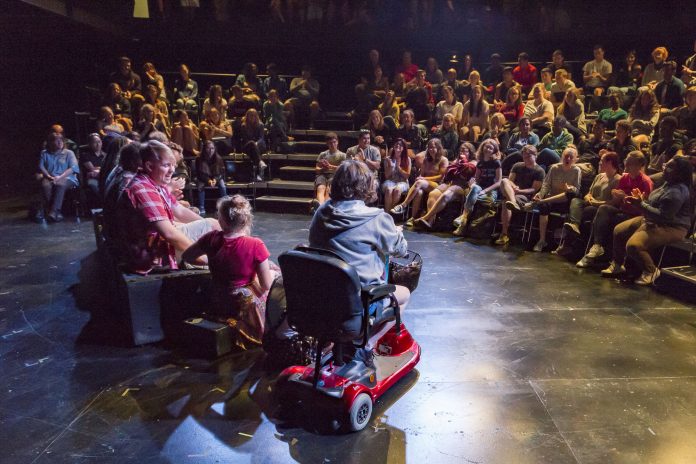Since its conception in 2006, the Sedehi Diversity Project (SDP) has provided the Muhlenberg community, in particular the incoming freshman class, with a look into the perspectives of interviewed students, staff and other faculty and Muhlenberg community members. The documentary play, performed over orientation weekend, puts a particular focus onto underrepresented members of the community and their ideas. During the five-week process of creating the play for that year, the student director and ensemble members work to decide which main ideas they want to present through the performance, based almost entirely on the information they received from the various community members that they interviewed, as well as incorporating a bit of their personal stories as well.
This year, the Sedehi Diversity Project was led by Melina Economos ’19, who had previously been in the ensemble of SDP, but, as a senior, served as the student director for this year’s production. Her role as student director included leading rehearsals, script-making, script-building and staging. Along with seven ensemble members and faculty advisor Troy Dwyer, they begin the process of creating the play in the spring and into the summer by interviewing Muhlenberg community members, transcribing these interviews and then going through them, picking out quotes and combining them to make the script. Economos called the Sedehi Diversity Project a “really good challenge for me because not only are we representing who we are as a community, but we were also lucky enough to have the set from Tal, which was a really fun directing challenge … in the round, and we also got to keep the rainbow floor.” This setting was new to this year; the Sedehi Diversity Project play had never been performed in the round before.
Ensemble member Robyn Phan ’21 explained how this element of the performance helped the cast members to be “constantly moving and making sure we connected with everyone who was there.” The play tells personal stories, and the play being in the round created a personal environment for the audiences to hear these stories as well.
The rehearsal process for SDP is a long and tedious one. Economos explained that “a stipulation of the project is that it has to be 35 minutes long,” but the first draft of the script was the length of “an eighty-minute show.” Once the show is cut down to a certain degree, the ensemble can begin staging in the Studio Theater. Economos explained that she and the ensemble members then have to “stage the piece while simultaneously cutting the show just so that it can reach 35 minutes.” The challenge of this task is not only to make such significant cuts, but to also “represent everyone’s stories in a fair way.”
One particularly impressive element of the play is that, according to Economos, “Everything that is in the script in the final project is something that someone actually said during one of those interviews, and it’s about finding a way to allow those different interview subjects and their voice to have a dialogue with each other without being present at everyone’s interviews.” It is in fact the content of the interviews that lead the director and ensemble members to decide what topics to focus on, not the other way around.
Phan explained, “Going into the interviews, we didn’t really have any set questions that we wanted to ask, except for the leading one, which was ‘What does diversity mean to you?’ We just let the interviewees guide us along what they wanted to talk about and went with it.” This process ensures that each year, the piece is unique, and every interviewee has a bit of their story being told.
Although the piece covers a variety of topics, one theme Economos personally hoped would shine through is activism at Muhlenberg. “The main goal for us was to say, ‘here’s the community that we have, here’s the community that you’re coming into, and here’s what you can do with it.’” This message would convey the opportunities for such activism on campus, and Economos hopes that particularly the incoming freshman know that “they can do that here with us. You don’t have to wait to do things. You can start doing it immediately.”
The performances seem to have had the profound impact on audience members who got to see them that Economos was hoping for. Kaelyn Kappes ’21 served as an Orientation Leader this year and was able to catch performances of this year’s play. Although she had seen the play as a freshman, she still “had been looking forward to seeing the show, because it always presents a mix of topics that [she is] well aware of and topics that have never crossed [her] mind.” The Diversity Project opens up room for dialogue where there might not have been previously, creating a rare atmosphere for incoming freshman and the rest of the Muhlenberg community as well. Through one part of the performance, the ‘privilege walk,’ Kappes explained that it really “puts into perspective how often we take our own privileges for granted and I always like watching the audience’s reaction during this part because the final tableau of the ‘race’ is a powerful image to see.”
Ultimately, The Sedehi Diversity Project, as Phan explained, helped her to realize that “there is so much more to Muhlenberg behind what they tell you on tours or what they show you on brochures, whether that be pretty stuff or the ugly stuff,” even in her freshman year. To provide this information from the Muhlenberg community’s perspective is a special opportunity that the college has had for the last twelve years, and the feedback that the Sedehi Diversity Project receives truly brings to light how crucial it is to the unique student experience of this school.






















